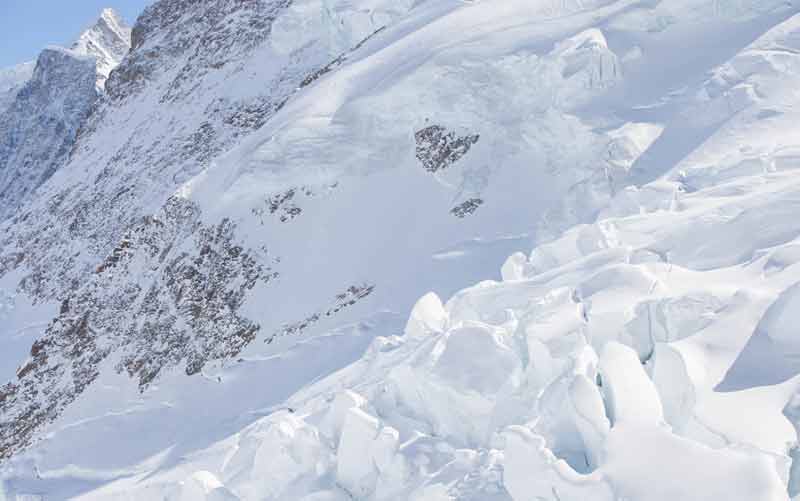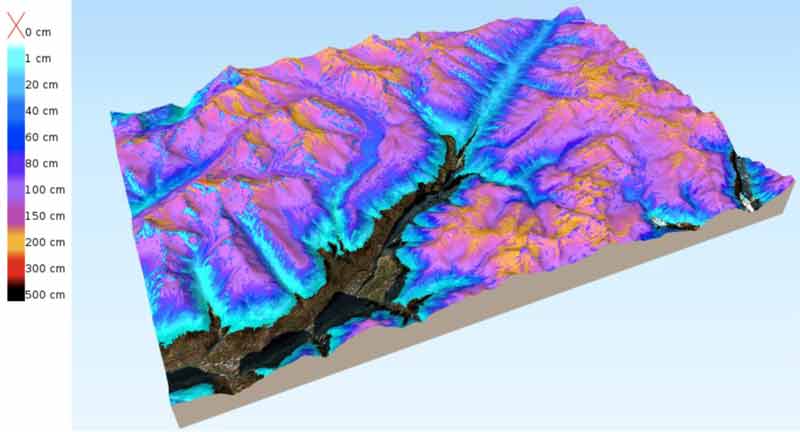Innosuisse supports projects in a wide range of areas, including tourism in Switzerland. Deep Snow is a prime example of what the Swiss Innovation Agency can offer in terms of support. This project, which is the result of cooperation between the EcoVision Lab at the Swiss Federal Institute of Technology (ETH) Zurich and the University of Zurich spin-off Exolabs, aims to measure snow cover in the mountains in real time. Further project partner include the WSL Institute for Snow and Avalanche Research SLF, Outdooractive, and MountaiNow.

Snow is an important component of the Earth's system, which covers about one-third of Earth’s land surface for some part of the year. Here in Switzerland everyone can relate to snow as “white gold” from the mountains. In fact, snow has an important economic value for different sectors, including tourism, insurance and hydropower and risk management. For example, electricity companies providing renewable energy from hydropower need to have reliable information on snow cover, melting and water-equivalent so as to manage water resources and production planning. Detailed knowledge about previous and current snow conditions is also crucial for defining snow avalanche risk areas. Solid decision-making on any snow related matter should be based on high-quality information being readily available. “Within “Deep Snow”, we aim at developing a novel snow mapping approach (covering snow cover, snow depth and snow water equivalent) centered on modern deep learning technology. Sparsely distributed snow data acquired during field surveys will be connected with dense, high-resolution remote sensing imagery to predict snow conditions at country-scale”, explains Jan Wegner, head of the EcoVision Lab.
Projects must be innovative to receive support from Innosuisse. This requirement is met in the case of Deep Snow, as Jan Wegner explains: “Currently, there exist several snow products, but most of them lack spatial detail, timely availability, a high degree of accuracy and a meaningful validation. Our common goal is to set new standards in monitoring of snow cover, snow depth and snow water equivalent with unprecedented accuracy and resolution for Switzerland.”
“Deep Snow is also an excellent example of collaboration between a research partner and an industrial partner – Innosuisse’s principal objective.” The “Innovation Projects” programme, which provides funding for the research element, also facilitates the exchange of experience between the various partners. “While the ETH has a long track record of developing and applying deep learning algorithms to environmental issues, ExoLab’s extensive experience in operational cloud processing for snow monitoring from space in near-real time is of particular importance for the Deep Snow project,” says Jan Wegner, explaining the benefits of using Innosuisse. There is active support during the proposal writing phase via the initial coaching program and the ICT mentoring offer, which is extremely valuable and ultimately helps writing a much better proposal. Another real advantage is that the time between proposal submission and funding decision is very short. Moreover, writing and submitting a proposal through the online interface is easy and without tedious bureaucratic hurdles”.

The project managers believe that mapping snow extent, depth and water equivalent together will have a high impact on tourism in Switzerland. The expected changes in climate, particularly related to temperature and precipitation in winter season, will probably result in a shorter time period suitable for skiing and a shift of the natural snow line to higher altitudes. Accordingly, the lack of snow could affect among other things the number of visitors and thus have economic impacts on winter tourism destinations. “The project results will therefore provide support to the destination marketing organizations (DMOs) for tourism planning and the development of climate change adaptation strategies: Dense snow maps of high temporal and spatial resolution that act as basis for further app-based services by the project partners will directly allow tourists to learn about the current snow situation. The obvious application is for tourists interested in winter sports who can decide where to go based on our new product. “It will also support the assessment of avalanche risk and could make the management of winter sport resorts more sustainable by reducing the need for artificial snow and improving general infrastructure planning,” says Reik Leiterer, CEO and co-founder of Exolabs.
Innosuisse aims to encourage all scientific and sustainable innovation through a variety of support solutions. This enables society to benefit from state-of-the-art infrastructure and allows academics and industry to continue adopting a creative approach. “Through Innosuisse's support, the necessary research needs can be met in order to bring a product to market that will far surpass existing products. “It also means a network of key players in the field can be established as part of the project, ensuring the end product has a high profile and maximum credibility in terms of product quality,” adds Reik Leiterer.
Text: Johanne Stettler
Last modification 27.06.2022





